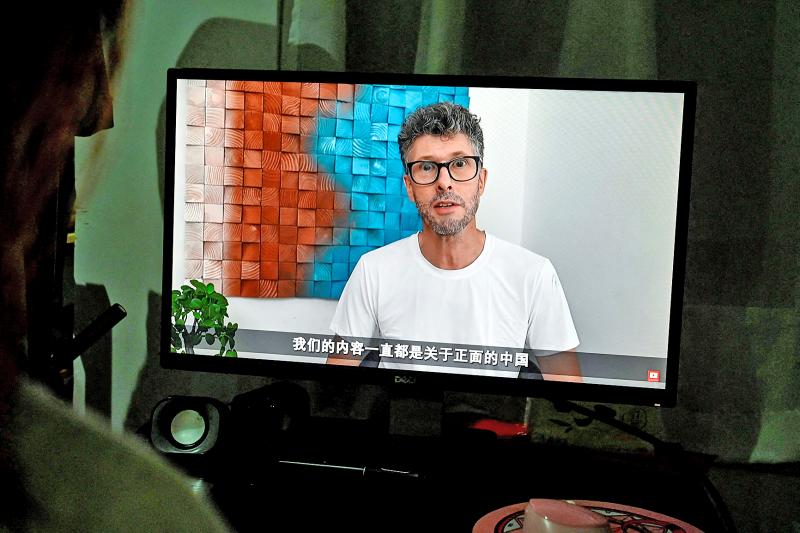With YouTube videos “debunking” allegations of human rights abuses and diatribes on Western “conspiracies” against China, an unlikely set of foreigners is loudly defending Beijing against international critics.
They are teachers and business owners from the UK, Colombia and Singapore, a collage of YouTubers garnering fame for their video takedowns of what they say are unfair accusations against Beijing.
Videos alternate between praise of China’s rapid development and rebuttals of negative foreign reports about the country.

Photo: AFP
Experts say they are being deployed as a weapon in the information war against China’s critics, with hundreds of videos reaching millions of viewers.
“I am trying to reach the people that have been brainwashed,” said Fernando Munoz Bernal, a Colombian English teacher in Dongguan, China, and the owner of the “FerMuBe” channel.
Bernal, who came to China in 2000 and has nearly 30,000 YouTube followers and 18,000 subscribers on the Chinese platform Bilibili, was among the vloggers who rebutted allegations of human rights abuses in Xinjiang this year.
In an April video, he accused foreign media of distorted reporting on Xinjiang and defended local businesses’ reluctance to speak to correspondents against “whatever lies and rumors journalists concoct.”
Western media seek to deflect from problems in their parts of the world by “creating enemies out of thin air” in China, he said.
He is not alone.
“Does this look like oppression? Take a look at this buffet,” says Brit Jason Lightfoot, with 173,000 subscribers, in another video of the same genre as he visits a restaurant in Guizhou Province.
The US and other governments allege genocide is taking place in Xinjiang, while rights groups say Chinese authorities have imposed mass detention and forced labor in the region.
Beijing denies the allegations, and has gone on the offensive against governments, individuals, media groups and companies that have promised probes into their Xinjiang supply chains.
The vloggers deny being paid mouthpieces for the Chinese government, instead claiming to be on self-appointed missions to clear up misconceptions about a country they love.
Their backgrounds are often in fields unrelated to current affairs or politics, while their videos blend scenes of everyday life with passionate commentaries defending China.
Bernal said he was motivated by fear of a conflict between China and the West sparked by what he calls a “disinformation campaign” against Beijing.
“If there is a war, it’s my life at risk,” he said.
Yet like the other YouTubers, Bernal’s subtitled videos get a warm reception on Chinese social media platforms, including Bilibili, while state media frequently republishes their content and features the vloggers online.
The same media often rip into unfavorable reporting by accredited foreign journalists.
“Where possible, the propaganda system is bound to integrate them into their own propaganda efforts,” said Florian Schneider, politics researcher and director of the Leiden Asia Centre in the Netherlands.
Bernal said he and other YouTubers shared “opportunities to collaborate with state media,” but insisted he was not a propagandist for the Chinese Communist Party.
His videos have featured tours sponsored by the government-run China Radio International, where he interviews other YouTubers about criticisms of China and explores rural development projects.
In one video, he slams the 2019 pro-democracy protests in Hong Kong as “terrorism” and suggests the US was attempting to provoke a war with China by supporting the movement, while referencing conspiracy theories about the Sept. 11, 2001, attacks.
Lee Barrett of the “Barrett” channel, which has more than 300,000 YouTube subscribers, recently addressed the question of state media repurposing his content for public relations.
“If you’re making some content that the government likes, or whatever, what’s the problem with them reposting it?” he asked in a video.
Barret declined to be interviewed by Agence France-Presse (AFP) after initially agreeing to speak.
Many of the vloggers started their channels with apolitical lifestyle videos, but their content has in the past few months dovetailed with official narratives.
Lightfoot’s early videos were focused on his travels around Asia as he sampled street food and sang at karaoke lounges.
However, last year, he began posting frequently on Western “lies” about China, while making spoof videos of an exaggerated, fictional “BSB news” network modeled after the BBC.
Beijing routinely condemns BBC reporting for alleged bias, accusing it of fabricating human rights abuses.
Lightfoot did not respond to a request for an interview.
It is difficult to quantify the influence of the YouTubers outside China, with many of their commenters claiming to be grateful Chinese.
Schneider said that raises a question about their target audience, as the videos are “hardly going to convince anyone who is not already a believer.”
While researchers have said China uses fake accounts and “bots” to manipulate online traffic, AFP did not find proof that the YouTubers were part of this effort.

THE TRAGEDY OF PUNCH: Footage of the seven-month-old Japanese macaque has gone viral online after he was rejected by his mother and formed a bond with a soft toy A baby monkey in Japan has captured hearts around the world after videos of him being bullied by other monkeys and rejected by his mother went viral last week. Punch, a Japanese macaque, was born in July last year at Ichikawa City Zoo. He has drawn international attention after zookeepers gave him a stuffed orangutan toy after he was abandoned by his mother. Without maternal guidance to help him integrate, Punch has turned to the toy for comfort. He has been filmed multiple times being dragged and chased by older Japanese macaques inside the enclosure. Early clips showed him wandering alone with

Australian Prime Minister Anthony Albanese yesterday said he did not take his security for granted, after he was evacuated from his residence for several hours following a bomb threat sent to a Chinese dance group. Albanese was evacuated from his Canberra residence late on Tuesday following the threat, and returned a few hours later after nothing suspicious was found. The bomb scare was among several e-mails threatening Albanese sent to a representative of Shen Yun, a classical Chinese dance troupe banned in China that is due to perform in Australia this month, a spokesperson for the group said in a statement. The e-mail

TENSIONS: The march went ahead without clashes, but arrests were still possible as police investigate suspects behind Nazi salutes, racist slurs and homophobic insults Thousands of people on Saturday marched in southeastern France under heavy security in tribute to a far-right activist whose killing, blamed on the hard left, has put the country on edge. The crowd — many wearing black and some covering their lower faces with masks — marched through the city of Lyon carrying flowers and placards bearing pictures of Quentin Deranque and the words: “justice for Quentin” and “the extreme left kills.” The 23-year-old died from head injuries following clashes between radical left and far-right supporters on the sidelines of a demonstration against a politician from the left-wing France Unbowed

‘OCCUPATION’: Hong Kong said it had lodged ‘stern protests’ with Panama’s consulate, and would ‘staunchly support’ the rights and interests of Hong Kong companies Panamanian President Jose Raul Mulino on Monday ordered the temporary occupation of two ports run by a unit of CK Hutchison Holdings Ltd following the Supreme Court’s ruling against the firm’s concession, escalating a dispute that has become a proxy battle between the US and China in Latin America. Mulino said in a speech that the administration and operation of the two ports on the strategic Panama Canal is to revert to the country’s National Maritime Authority to ensure their uninterrupted, safe and efficient operation. The occupation covers movable equipment at the ports and does not mean a definitive loss of